33rd United States Congress
| 33rd United States Congress | |
|---|---|
32nd ← → 34th | |
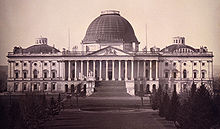 United States Capitol (1846) | |
March 4, 1853 – March 4, 1855 | |
| Members | 62 senators 234 representatives 7 non-voting delegates |
| Senate Majority | Democratic |
| Senate President | William R. King (Democrat) (until April 18, 1853) Vacant (from April 18, 1853) |
| House Majority | Democratic |
| House Speaker | Linn Boyd (Democrat) |
| Sessions | |
| Special: March 4, 1853 – April 11, 1853 1st: December 5, 1853 – August 7, 1854 2nd: December 4, 1854 – March 4, 1855 | |
The 33rd United States Congress was a meeting of the legislative branch of the United States federal government, consisting of the United States Senate and the United States House of Representatives. It met in Washington, D.C. from March 4, 1853, to March 4, 1855, during the first two years of the administration of U.S. President Franklin Pierce. During this session, the Kansas–Nebraska Act was passed, an act that soon led to the creation of the Republican Party. The apportionment of seats in the House of Representatives was based on the Seventh Census of the United States in 1850. Both chambers had a Democratic majority.
Major events[]
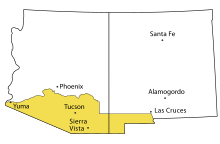
- March 4, 1853: Franklin Pierce became 14th President of the United States
- April 18, 1853: Vice President William R. King died
- July 8, 1853: Commodore Matthew C. Perry arrived in Edo Bay with a request for a trade treaty
- December 30, 1853: Gadsden Purchase: The United States bought land from Mexico to facilitate railroad building in the Southwest
- March 20, 1854: Republican Party founded
Major legislation[]
- May 30, 1854: Kansas–Nebraska Act, ch. 59, 10 Stat. 277
- March 3, 1855: The U.S. Congress appropriates $30,000 to create the U.S. Camel Corps
Treaties[]
- January 26, 1854: Point No Point Treaty signed
- March 31, 1854: Convention of Kanagawa signed with the Japanese government, opening the ports of Shimoda and Hakodate to American trade
Territories organized[]
- May 30, 1854 – Kansas Territory was organized.
- May 30, 1854 – Nebraska Territory was organized.
Party summary[]
Senate[]
| Party (shading shows control) |
Total | Vacant | |||||
|---|---|---|---|---|---|---|---|
| Know Nothing (A) |
Democratic (D) | Free Soil (F) | Whig (W) | Other (O) |
|||
| End of previous congress | 0 | 34 | 4 | 23 | 0 | 61 | 1 |
| Begin | 1 | 35 | 2 | 19 | 0 | 57 | 5 |
| End | 37 | 5 | 17 | 60 | 2 | ||
| Final voting share | 1.7% | 61.7% | 8.3% | 28.3% | 0.0% | ||
| Beginning of next congress | 2 | 35 | 2 | 9 | 7 | 55 | 7 |
House of Representatives[]
For the beginning of this congress, the size of the House was increased from 233 seats to 234 seats, following the 1850 United States Census (See 9 Stat. 433).
| Affiliation | Party (Shading indicates majority caucus)
|
Total | ||||||
|---|---|---|---|---|---|---|---|---|
| Democratic (D) |
Independent Democratic (ID) |
Free Soil (FS) |
Whig (W) |
Independent (I) |
Other | Vacant | ||
| End of previous Congress | 125 | 3 | 4 | 86 | 0 | 14 | 232 | 1 |
| Begin | 157 | 1 | 4 | 71 | 1 | 0 | 234 | 0 |
| End | 155 | 3 | 74 | |||||
| Final voting share | 66.7% | 0.4% | 0.9% | 31.6% | 0.4% | 0.1% | ||
| Beginning of next Congress | 79 | (Opposition coalition) 154 |
233 | 1 | ||||
Leadership[]

William R. King
Senate[]
- President: William R. King (D), until April 18, 1853; vacant thereafter.
- President pro tempore: David R. Atchison (D), until December 4, 1854
- Lewis Cass (D), December 4, 1854
- Jesse D. Bright (D), from December 5, 1854
House of Representatives[]
- Speaker: Linn Boyd (D)
- Democratic Caucus Chairman: Edson B. Olds
Members[]
This list is arranged by chamber, then by state. Senators are listed by class, and representatives are listed by district.
Senate[]
Senators were elected by the state legislatures every two years, with one-third beginning new six-year terms with each Congress. Preceding the names in the list below are Senate class numbers, which indicate the cycle of their election. In this Congress, Class 1 meant their term began in the last Congress, requiring re-election in 1856; Class 2 meant their term began with this Congress, requiring re-election in 1858; and Class 3 meant their term ended with this Congress, requiring re-election in 1854. The United States consisted of 31 states during this Congress.
Alabama[]
Arkansas[]
California[]
Connecticut[]
Delaware[]
Florida[]
Georgia[]
Illinois[]
Indiana[]
Iowa[]
Kentucky[]
Louisiana[]
Maine[]
Maryland[]
Massachusetts[]
Michigan[]
|
Mississippi[]
Missouri[]
New Hampshire[]
New Jersey[]
New York[]
North Carolina[]
Ohio[]
Pennsylvania[]
Rhode Island[]
South Carolina[]
Tennessee[]
Texas[]
Vermont[]
Virginia[]
Wisconsin[]
|
 Senators' party membership by state at the opening of the 33rd Congress in March 1853. The gray stripes represent Know-Nothings. The green stripes represent Free Soil. 2 Democrats 1 Democrat and 1 Whig 2 Whigs |
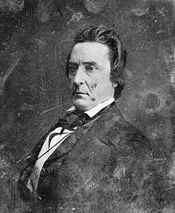 Senate President pro tempore David R. Atchison 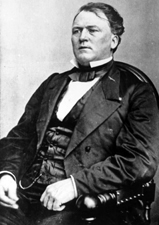 Senate President pro tempore Jesse D. Bright
|
House of Representatives[]
The names of members of the House of Representatives are preceded by their district numbers.
Alabama[]
Arkansas[]
California[]Both representatives were elected statewide on a general ticket. Connecticut[]
Delaware[]
Florida[]
Georgia[]
Illinois[]
Indiana[]
Iowa[]Kentucky[]
Louisiana[]Maine[]
Maryland[]
Massachusetts[]
Michigan[]
Mississippi[]
Missouri[]
New Hampshire[]
New Jersey[]
|
New York[]
North Carolina[]
Ohio[]
Pennsylvania[]
Rhode Island[]South Carolina[]
Tennessee[]
Texas[]Vermont[]Virginia[]
Wisconsin[]
Non-voting members[]
|
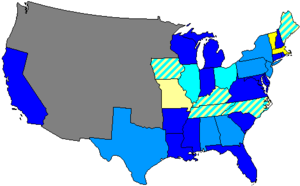
 House Speaker Linn Boyd
| ||||||||
Changes in membership[]
The count below reflects changes from the beginning of the first session of this Congress.
Senate[]
- Replacements: 7
- Democrats (D): 2 seat net gain
- Whigs (W): 2 seat net loss
- Free Soilers (FS): 2 seat net gain
- Know Nothing (A): 1 seat net gain
- Deaths: 2
- Resignations: 4
- Interim appointments: 1
- Total seats with changes: 13
| State (class) |
Vacated by | Reason for change | Successor | Date of successor's formal installation[a] |
|---|---|---|---|---|
| Rhode Island (2) |
Vacant | Failure to elect. Successor was elected July 20, 1853. |
Philip Allen (D) | July 20, 1853 |
| Alabama (2) |
Vacant | Failure to elect. Successor elected November 29, 1853. |
Clement C. Clay (D) | November 29, 1853 |
| Mississippi (2) |
Vacant | Failure to elect. Successor elected January 7, 1854. |
Albert G. Brown (D) | January 7, 1854 |
| Maine (2) |
Vacant | Failure to elect. Successor was elected February 10, 1854. |
William P. Fessenden (W) | February 10, 1854 |
| North Carolina (2) |
Vacant | Failure to elect. Successor was elected December 6, 1854. |
David Reid (D) | December 6, 1854 |
| Arkansas (3) |
Solon Borland (D) | Resigned April 11, 1853, after being appointed U.S. Minister to Nicaragua and other Central American Republics. Successor appointed July 6, 1853. |
Robert W. Johnson (D) | July 6, 1853 |
| Louisiana (3) |
Pierre Soulé (D) | Resigned April 11, 1853, after being appointed U.S. Minister to Spain. Successor elected December 5, 1853. |
John Slidell (D) | December 5, 1853 |
| New Hampshire (2) |
Charles G. Atherton (D) | Died November 15, 1853. | Jared W. Williams (D) | November 29, 1853 |
| Vermont (3) |
Samuel S. Phelps (W) | Senate declared not entitled to seat March 16, 1854. Successor elected October 14, 1854. |
Lawrence Brainerd (W) | October 14, 1854 |
| Connecticut (3) |
Truman Smith (W) | Resigned May 24, 1854. Successor was elected May 24, 1854. |
Francis Gillette (W) | May 24, 1854 |
| Massachusetts (2) |
Edward Everett (W) | Resigned June 1, 1854 Successor was appointed to serve until a new successor was elected. |
Julius Rockwell (W) | June 3, 1854 |
| New Hampshire (2) |
Jared W. Williams (D) | Resigned August 4, 1854. | Vacant | Not filled this term |
| New Hampshire (3) |
Moses Norris Jr. (D) | Died January 11, 1855. Successor appointed January 16, 1855, to finish the term. |
John S. Wells (D) | January 16, 1855 |
| Massachusetts (2) |
Julius Rockwell (W) | Successor elected January 31, 1855. | Henry Wilson (A) | January 31, 1855 |
| Iowa (3) |
Augustus C. Dodge (D) | Resigned February 22, 1855, after being appointed U.S. Minister to Spain. | Vacant | Not filled this term |
House of Representatives[]
- Replacements: 7
- Democrats (D): 2 seat net loss
- Whigs (W): 3 seat net gain
- Free Soilers (FS): 1 seat net loss
- Deaths: 4
- Resignations: 4
- Total seats with changes: 8
| District | Vacated by | Reason for change | Successor | Date of successor's formal installation[a] |
|---|---|---|---|---|
| Washington Territory at-large | Vacant | New seat established after Washington became a territory near the end of previous Congress. Seat was vacant until April 12, 1854. | Columbia Lancaster (D) | Seated April 12, 1854 |
| New York 29th | Azariah Boody (W) | Resigned on October 13, 1853 | Davis Carpenter (W) | Seated November 8, 1853 |
| Tennessee 1st | Brookins Campbell (D) | Died December 25, 1853 | Nathaniel G. Taylor (W) | Seated March 30, 1854 |
| Pennsylvania 8th | Henry A. Muhlenberg (D) | Died January 9, 1854 | J. Glancy Jones (D) | Seated February 4, 1854 |
| Massachusetts 1st | Zeno Scudder (W) | Resigned March 4, 1854 | Thomas D. Eliot (W) | Seated April 17, 1854 |
| Kansas Territory at-large | New seat | New seat established after Kansas became a territory May 30, 1854. Seat was vacant until December 20, 1854. | John W. Whitfield (D) | Seated December 20, 1854 |
| Nebraska Territory at-large | New seat | New seat established after Nebraska became a territory May 30, 1854. Seat was vacant until January 5, 1855. | Napoleon B. Giddings (D) | Seated December 5, 1855 |
| Virginia 11th | John F. Snodgrass (D) | Died June 5, 1854 | Charles S. Lewis (D) | Seated December 4, 1854 |
| New York 12th | Gilbert Dean (D) | Resigned July 3, 1854, after being appointed justice of the Supreme Court of New York | Isaac Teller (W) | Seated November 7, 1854 |
| New York 22nd | Gerrit Smith (W) | Resigned August 7, 1854 | Henry C. Goodwin (W) | Seated November 7, 1854 |
| Kentucky 3rd | Presley Ewing (W) | Died September 27, 1854 | Francis Bristow (W) | Seated December 4, 1854 |
Committees[]
List of committees and their party leaders.
Senate[]
- Agriculture (Chairman: Philip Allen)
- (Select)
- (Select)
- Audit and Control the Contingent Expenses of the Senate (Chairman: Josiah J. Evans)
- Claims (Chairman: Richard Brodhead)
- Commerce (Chairman: Hannibal Hamlin)
- (Select)
- District of Columbia (Chairman: Moses Norris Jr.)
- Engrossed Bills (Chairman: Benjamin Fitzpatrick)
- Finance (Chairman: Robert M.T. Hunter)
- Foreign Relations (Chairman: James M. Mason)
- (Select)
- Indian Affairs (Chairman: William K. Sebastian)
- Judiciary (Chairman: Andrew P. Butler)
- Library (Chairman: James A. Pearce)
- (Select)
- Manufactures (Chairman: Hannibal Hamlin)
- (Select)
- Military Affairs (Chairman: James Shields)
- Militia (Chairman: Sam Houston)
- Naval Affairs (Chairman: William M. Gwin)
- (Select)
- (Select) (Chairman: William M. Gwin)
- Patents and the Patent Office (Chairman: Charles T. James)
- Pensions (Chairman: George Wallace Jones)
- Post Office and Post Roads (Chairman: Thomas J. Rusk)
- Printing (Chairman: Benjamin Fitzpatrick)
- (Select)
- Private Land Claims (Chairman: John Pettit)
- (Select)
- Public Buildings and Grounds (Chairman: James A. Bayard Jr.)
- Public Lands (Chairman: Augustus Dodge)
- (Chairman: Stephen Adams)
- Revolutionary Claims (Chairman: Isaac P. Walker)
- (Chairman: John Slidell)
- (Select)
- Tariff Regulation (Select)
- Territories (Chairman: Stephen A. Douglas)
- Whole
House of Representatives[]
- Accounts (Chairman: Carlton B. Curtis)
- Agriculture (Chairman: John L. Dawson)
- Claims (Chairman: Alfred P. Edgerton)
- Commerce (Chairman: Frederick P. Stanton)
- District of Columbia (Chairman: William T. Hamilton)
- Elections (Chairman: Richard H. Stanton)
- Engraving (Chairman: George R. Riddle)
- Expenditures in the Navy Department (Chairman: Fayette McMullen)
- Expenditures in the Post Office Department (Chairman: Samuel Lilly)
- Expenditures in the State Department (Chairman: Daniel Wells Jr.)
- Expenditures in the Treasury Department (Chairman: David Stuart)
- Expenditures in the War Department (Chairman: George W. Kittredge)
- Expenditures on Public Buildings (Chairman: Henry A. Edmundson)
- Foreign Affairs (Chairman: Thomas H. Bayly)
- Indian Affairs (Chairman: James L. Orr)
- Invalid Pensions (Chairman: Thomas A. Hendricks)
- Judiciary (Chairman: Frederick P. Stanton)
- Manufactures (Chairman: John McNair)
- Mileage (Chairman: Andrew J. Harlan)
- Military Affairs (Chairman: William H. Bissell)
- Militia (Chairman: Elijah W. Chastain)
- Naval Affairs (Chairman: Thomas S. Bocock)
- Patents (Chairman: Benjamin B. Thurston)
- Post Office and Post Roads (Chairman: Edson B. Olds)
- Private Land Claims (Chairman: Junius Hillyer)
- Public Buildings and Grounds (Chairman: Francis B. Craige)
- Public Expenditures (Chairman: William H. Kurtz)
- Public Lands (Chairman: David T. Disney)
- Revisal and Unfinished Business (Chairman: Williamson R. W. Cobb)
- Revolutionary Claims (Chairman: Rufus W. Peckham)
- Revolutionary Pensions (Chairman: William M. Churchwell)
- Roads and Canals (Chairman: Cyrus L. Dunham)
- Rules (Select)
- Standards of Official Conduct
- Territories (Chairman: William A. Richardson)
- Ways and Means (Chairman: George S. Houston)
- Whole
Joint committees[]
- Enrolled Bills (Chairman: Sen. George Wallace Jones)
- The Library (Chairman: Joseph R. Chandler)
- Printing (Chairman: William Murray)
Caucuses[]
- Democratic (House)
- Democratic (Senate)
Employees[]
Legislative branch agency directors[]
- Architect of the Capitol: Thomas U. Walter
- Librarian of Congress: John Silva Meehan
Senate[]
- Chaplain: Clement M. Butler (Episcopalian), until December 7, 1853
- Henry Slicer (Methodist), elected December 7, 1853
- Secretary: Asbury Dickins
- Sergeant at Arms: , until March 17, 1853
- Dunning R. McNair, elected March 17, 1853
House of Representatives[]
- Chaplain: William H. Milburn (Methodist)
- Clerk: John W. Forney
- Doorkeeper:
- Postmaster:
- Reading Clerks:[data unknown/missing]
- Sergeant at Arms: Adam J. Glossbrenner
See also[]
- 1852 United States elections (elections leading to this Congress)
- 1852 United States presidential election
- 1852 and 1853 United States Senate elections
- 1852 and 1853 United States House of Representatives elections
- 1854 United States elections (elections during this Congress, leading to the next Congress)
Notes[]
References[]
- Martis, Kenneth C. (1989). The Historical Atlas of Political Parties in the United States Congress. New York: Macmillan Publishing Company.
- Martis, Kenneth C. (1982). The Historical Atlas of United States Congressional Districts. New York: Macmillan Publishing Company.
External links[]
- Statutes at Large, 1789–1875
- Senate Journal, First Forty-three Sessions of Congress
- House Journal, First Forty-three Sessions of Congress
- Biographical Directory of the U.S. Congress
- U.S. House of Representatives: House History
- U.S. Senate: Statistics and Lists
- Congressional Directory for the 33rd Congress, 1st Session.
- Congressional Directory for the 33rd Congress, 2nd Session.
- 33rd United States Congress